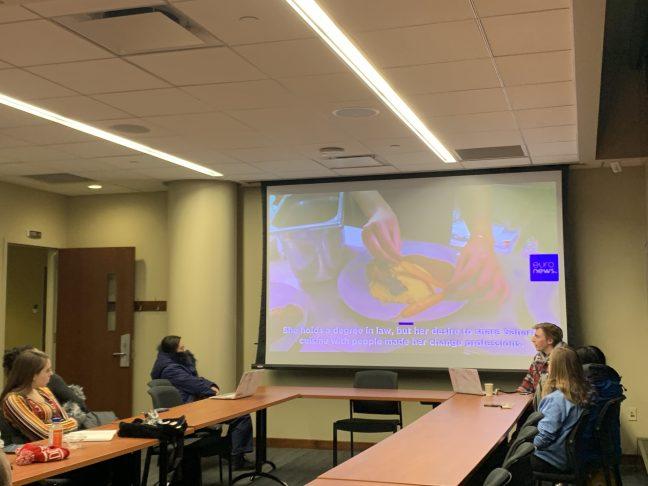The Wisconsin Union Directorate Cuisine discussed the refugee crises and the coherent food culture changes refugees have had to adapt to at their weekly meeting Thursday.
Outreach Assistant Director Will Hofkamp said the refugee crisis, which has been a persistent problem, has disappeared from the western world’s news radar.
Hofkamp said 70.8 million refugees in total have been forcibly displaced, however, not all of these people are considered refugees because they have been removed from their homes—but not removed from the country. They are considered internally displaced.
Hofkamp added 57% are refugees who have come from Syria, Afghanistan and South Sudan, and 80% of those refugees are being displaced to neighboring countries such as Turkey and Jordan, not first world countries, as opposed to popular belief.
Hofkamp said a lot of these first world countries should provide humanitarian aid in the form of accommodating refugees.
Most refugees, according to Hofkamp, are located in neighboring countries leading to population and disease issues because people are clustered into considerably tiny areas in makeshift tents.
Hofkamp said the refugees migrate with very little money causing them to be unable to afford food or rent, which is the cause of these tent cities. He said the temporary settlements are provided by host countries, but a lot of the refugees are prohibited from making the structures more permanent.
Hofkamp specifically focused on the food aspect of these refugee camps. He said the food they have is provided by the United Nations High Commissioner for Refugees and is often frozen items. He added the consistent supply of fresh food they would have in their country is very different from what they have in the refugee camps.
Berkely professor discusses research into food sustainability
According to Hofkamp, most people in the refugee camps in Jordan are on the food voucher system, which provides them with a food voucher each week equivalent to 10 Jordnainan dollars. The refugees depend on these food vouchers as they are unable to earn money through employment.
Hofkamp said the rise of the refugee food culture is due to the resources they are provided. He said the refugees are unable to afford higher quality ingredients causing them to change their eating habits to adapt to their environment.
“People who are displaced to America definitely don’t have access to a lot of the spices that are prevalent in the Middle East or Asia or Africa,” Hofkamp said.
UW graduate student pushes to alleviate student food insecurity
He added that since the seasons and availability of fresh, affordable ingredients are different, refugees have to alter the seasonal foods they buy and the seasonal recipes they use.
Hofkamp said UNHCR has started refugee food festivals around the world to combat this problem.
“[Food festivals have] given the refugees a platform to show off their cooking skills, to show recipes from their home countries and then show the new recipes they have adapted from living as displaced people,” Hofkamp said.
He said these food festivals provide cash flow and job opportunities for the refugees, consequently allowing them to feed their people.
Hofkamp shared examples from a Greek refugee camp where he witnessed commonalities among the recipes such as Syrian lamb, but also substitutions such as eggplant. He said the refugees try to keep as much similarity as they can and substitute with what is available.
“It is this evolving thing that has been born out of necessity,” Hofkamp said. “It has sort of challenged the idea of what these traditional recipes can be.”
Hofkamps said people in America can be inspired to eat on budget and apply these ideas for eating at home.
In the end, Hofkamp connected the issue of refugees to the American Dream and posed the question of whether that still an attainable dream.


















